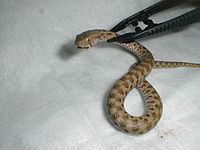Macrovipera lebetina obtusa: Difference between revisions
Jump to navigation
Jump to search

Pat Palmer (talk | contribs) m (Text replacement - "[[Snake" to "[[Snake (animal)") |
John Leach (talk | contribs) m (Text replacement - "Iraq" to "Iraq") |
||
| Line 5: | Line 5: | ||
| name = ''Macrovipera lebetina obtusa'' | | name = ''Macrovipera lebetina obtusa'' | ||
| image = Blunt Nose Viper.jpg | | image = Blunt Nose Viper.jpg | ||
| image_caption = Juvenile specimen from | | image_caption = Juvenile specimen from Iraq. | ||
| regnum = [[Animal]]ia | | regnum = [[Animal]]ia | ||
| phylum = [[Chordata]] | | phylum = [[Chordata]] | ||
| Line 36: | Line 36: | ||
==Geographic range== | ==Geographic range== | ||
From central [[Turkey]] through [[Syria]], [[Lebanon]], | From central [[Turkey]] through [[Syria]], [[Lebanon]], Iraq, northern [[Jordan]], the [[Caucasus]] region (incl. [[Armenia]]), [[Azerbaijan]], [[Dagestan]], Iran, southern Afghanistan, Pakistan and northern [[India]] ([[Kashmir]]). According to Khan (1983), ''M. lebetina'' is restricted to the western highlands in Pakistan; it is allopatric with ''[[Daboia|Daboia russelii]]'', which occurs in the Indus River valley.<ref name="Mal03"/> | ||
==See also== | ==See also== | ||
Revision as of 15:53, 12 March 2024
- The content on this page originated on Wikipedia and is yet to be significantly improved. Contributors are invited to replace and add material to make this an original article.
| Macrovipera lebetina obtusa | ||||||||||||||||||||||
|---|---|---|---|---|---|---|---|---|---|---|---|---|---|---|---|---|---|---|---|---|---|---|
 Juvenile specimen from Iraq.
| ||||||||||||||||||||||
| Scientific classification | ||||||||||||||||||||||
| ||||||||||||||||||||||
| Trinomial name | ||||||||||||||||||||||
| Macrovipera lebetina obtusa (Dwigubsky, 1832) | ||||||||||||||||||||||
| Synonyms | ||||||||||||||||||||||
|
Common names: (none).
Macrovipera lebetina obtusa is a venomous viper subspecies[2] found between central Turkey and northern Pakistan (Kashmir).
Description
Distinguished by its higher scale counts -- usually 170-175 ventrals and 25 (sometimes 27) midbody dorsal scales -- and relatively dark color pattern.[3]
Geographic range
From central Turkey through Syria, Lebanon, Iraq, northern Jordan, the Caucasus region (incl. Armenia), Azerbaijan, Dagestan, Iran, southern Afghanistan, Pakistan and northern India (Kashmir). According to Khan (1983), M. lebetina is restricted to the western highlands in Pakistan; it is allopatric with Daboia russelii, which occurs in the Indus River valley.[3]
See also
- Macrovipera lebetina.
- List of viperine species and subspecies.
- True vipers - Common names.
- True vipers - Synonymy.
- Snake (animal)bite.
Cited references
- ↑ McDiarmid RW, Campbell JA, Touré T. 1999. Snake Species of the World: A Taxonomic and Geographic Reference, vol. 1. Herpetologists' League. 511 pp. ISBN 1-893777-00-6 (series). ISBN 1-893777-01-4 (volume).
- ↑ Macrovipera lebetina obtusa (TSN 635244). Integrated Taxonomic Information System. Accessed on 10 August 2006.
- ↑ 3.0 3.1 Mallow D, Ludwig D, Nilson G. 2003. True Vipers: Natural History and Toxinology of Old World Vipers. Krieger Publishing Company, Malabar, Florida. 359 pp. ISBN 0-89464-877-2.
Other references
- Golay P, Smith HM, Broadley DG, Dixon JR, McCarthy. Golray P, Schatti J-C, Toriba M. 1993. Endoglyphs and Other Major Venomous Snakes of the World: A Checklist. New York: Springer-Verlag. 393 pp.
External links
- Species Macrovipera lebetina at the Species2000 Database